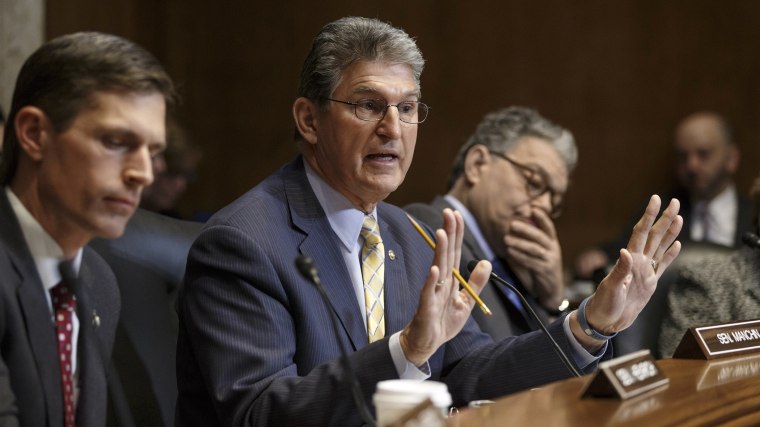There are several centrist Senate Democrats up for re-election this year in states Donald Trump won with relative ease two years ago, and none of them is likely looking forward to the upcoming fight over Judge Brett Kavanaugh's Supreme Court nomination.
Indeed, the pressure began before the announcement was even made, when the White House invited three of these Senate Dems -- Indiana's Joe Donnelly, West Virginia's Joe Manchin, and North Dakota's Heidi Heitkamp -- to last night's event. They all politely declined.
The pressure, however, is just getting started.
Within minutes of President Donald Trump announcing Brett Kavanaugh as his Supreme Court nominee, a conservative judicial advocacy group unveiled a $1.4 million ad buy aimed at pressuring four vulnerable Democrats to support him.The Judicial Crisis Network announced its "Confirm Kavanaugh" campaign of cable and digital ads in Alabama, Indiana, North Dakota and West Virginia. These all happen to be Republican-majority states with a Democratic senator: Doug Jones (Ala.), Joe Donnelly (Ind.), Heidi Heitkamp (N.D.) and Joe Manchin (W.Va.).
At first blush, this may seem like the kind of tactic the president's allies would utilize if they were working to secure the nominee's confirmation. But that's not the political dynamic unfolding on Capitol Hill right now, where the Senate Republican majority can confirm Kavanaugh entirely on its own, without any Democratic votes.
Rather, the pressure campaign is driven entirely by electoral considerations: the right hopes to use the Supreme Court fight to defeat some Democratic incumbents and ensure that the Senate remains under Republican control.
But while many see this as an "agonizing" choice for red-state Dems, I have a hunch we know how this will play out.
In this 51-49 Senate, with Sen. John McCain (R-Ariz.) ailing in Arizona, the strategy for the left isn't complicated: keep Senate Democrats together and find a Republican or two who might not be comfortable casting a vote to move the Supreme Court even further to the right. The most likely suspects are Sens. Susan Collins of Maine and Lisa Murkowski of Alaska.
Let's say for the sake of conversation that the centrist Dems in question would like to oppose Trump's nominee, but they're understandably concerned that the vote would be used against them in their tough re-election fights. So do they prioritize their principles or their political survival?
The answer, it seems to me, is to wait and watch Collins and Murkowski. If the more moderate Republicans balk at Kavanaugh, red-state Democrats will have bipartisan cover to do the same. If Collins and Murkowski throw their support behind the president's nominee, then Kavanaugh will be confirmed anyway, and red-state Democrats can cast their votes with the knowledge that they won't change the outcome either way.
I don't imagine this will be an enjoyable process for them, but it's not that tough.
